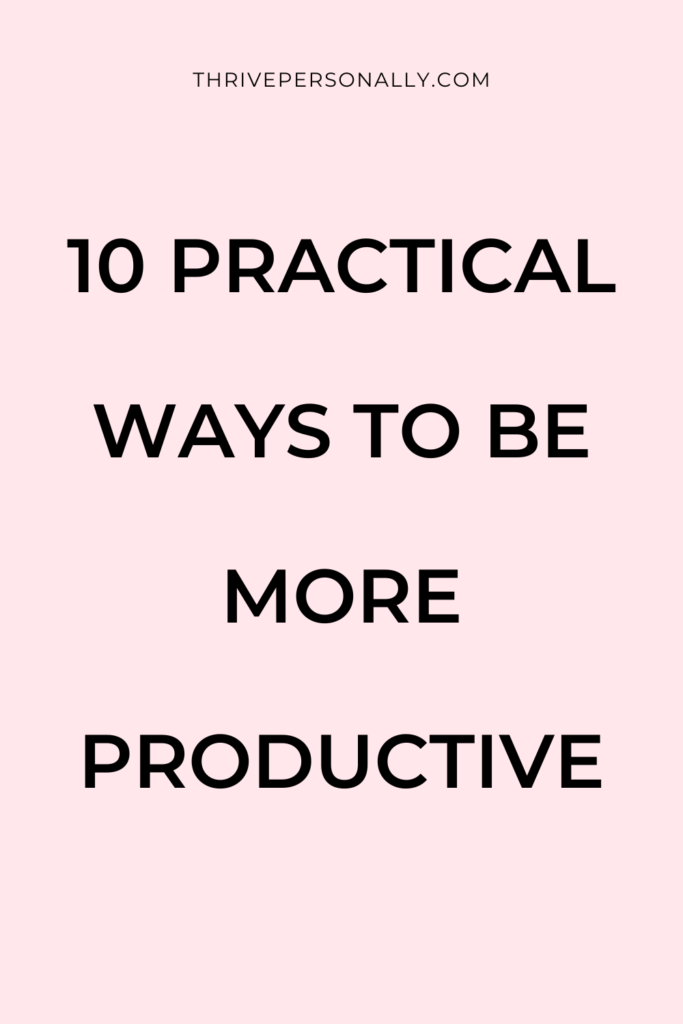Time waste refers to any action, thought, or external influence that distracts an individual from being productive. Time is limited, and wasting it can result in negative effects on an individual’s goals and productivity. Time waste can be categorized in numerous ways. Some of the most common ways in which time is wasted are spending excessive time on social media, unnecessary meetings, and lack of focus or direction.
Learning how to use time effectively and productively is a crucial skill that can significantly improve an individual’s life.
10 Practical Ways to Stop Wasting Time
Are you one of those people that feel like time is never enough? Or that you always find ways to waste time when you should be productive?
If you answered yes, this post is just for you. Keep reading to discover 10 practical ways to stop wasting time.
1. Plan your day the night before
Planning the day the night before is one of the best time-saving tips and tricks to use.
Instead of waiting until the morning to think about what to do, take five minutes before bed to create a to-do list for the next day.
Having a plan for the next day will help you get the most out of your time. It can also help you sleep better, knowing you’re organized and ready for the day ahead.
Some tips for planning your day the night before include:
- Identify your top three to four tasks for the day
- Write down tasks in order of priority
- Be realistic when setting tasks for the next day to avoid feeling overwhelmed
Related: 20 Achievable Goals to Help You Grow and Improve
2. Set clear and specific goals
One of the things that make people waste their time is that they don’t have a clear direction on what they should be doing.
Without clear goals, it’s easy to get distracted by unnecessary activities that won’t help you reach your objectives.
One of the best ways to set yourself up for success is by setting specific, realistic goals.
Instead of saying, “I want to do better in school,” try, “I will study math for 30 minutes every day.”
Setting clear goals also helps you break down larger tasks into smaller and achievable steps. This, in turn, makes it easier to stay on track and focused on what you need to do.
Related: 10 Healthy Habits That Can Boost Your Mental Health
3. Use a timer to stay focused
Focus is one of the most important factors when it comes to time management. If you’re not focused, you’re more likely to be distracted by other things and waste your time.
One of the best ways to stay focused is by using a timer.
Try the Pomodoro technique, which involves working for 25 minutes and then taking a five-minute break. The timer helps you stay on track and focused on the task at hand.
If 25 minutes feels like a lot, start with 10 minutes, or even 5 minutes, and work your way up.
The key is to work with no distractions during the set time and then take a break when the timer goes off.
Related: 8 Practical Steps to Overcome Laziness
4. Stop multitasking

Multitasking may seem like an efficient way to get things done, but it can actually be a huge time-waster.
When you try to do multiple tasks at once, you’re not giving any of them your full attention, which can lead to errors and mistakes.
Instead of trying to do too many things at once, focus on one task at a time and give it your full attention.
For example, if you’re working on an essay, turn off all notifications on your phone and computer and focus solely on writing.
Once you’re done, move on to the next task. You’ll get more done in less time and with fewer mistakes.
5. Limit social media and screen time
We all know social media can be a massive time-waster. It’s so easy to get sucked into endless scrolling and end up spending hours on your phone or computer.
One of the best ways to stop wasting time on social media is by setting limits for yourself.
Try to only allow yourself 15 minutes in the morning and 15 minutes at night to check social media. Turn off all notifications so you’re not tempted to check your phone every two minutes.
There are also many apps out there that can help you block distracting websites or track your screen time, which can be helpful if you’re trying to be more accountable to yourself.
6. Create a clean and organized workspace
A messy room or desk can make it difficult to focus on the task at hand. You’re more likely to get distracted and waste your time when your environment is disorganized.
A clean and organized space makes it easier to focus and be productive. It also helps create a routine for yourself by doing the same task every day at the same time.
If the idea of cleaning your whole room feels overwhelming, start small. Take five minutes every day and tidy up one corner of your room or desk.
Gradually, your space will start to feel more organized and manageable.
7. Stop procrastinating
Procrastination is one of the biggest time-wasters of all.
If you’re always putting things off until the last minute, you’re wasting valuable time that could be spent doing something more productive.
To combat procrastination, it’s essential to understand why you do it.
Are you avoiding a task because it feels too hard? Or maybe you’re worried about failing?
Once you know what’s causing you to procrastinate, you can start taking steps to overcome it.
One of the best ways to stop procrastinating is by getting started.
Even if it’s just for five minutes, force yourself to do something. Once you get started, you’ll often find that the task isn’t as bad as you thought it would be.
You can also use rewards as motivation to stop procrastinating.
Tell yourself that if you finish that task, you can watch your favorite show or have a cookie.
Related: 8 Simple Tips to Beat Procrastination and Get Things Done
8. Take regular breaks to recharge

It’s also important to take regular breaks throughout the day to recharge your batteries.
Sitting at a desk for hours on end is not only bad for your productivity but also for your health.
Taking regular breaks helps you rest and refresh your mind so that you can return to work feeling energized and focused.
Some ways to take a quick break include:
- Stretching
- Grabbing a drink of water
- Closing your eyes for a few minutes
- Walking around your room or house
The important thing is to take a few minutes to step away from your work so you can return to it feeling refreshed and focused.
9. Learn to say no
You can also save time by learning to say no to things that don’t interest you or benefit you in any way.
If you have poor boundaries, you’ll often find yourself agreeing to things that will waste your time.
Learning to say no is not selfish or unkind. It’s simply being honest about what you want and don’t want to do with your time.
If you don’t want to watch a movie with your friends, say no and watch one later when you have the free time to do so.
If someone asks you to do them a favor that you don’t have the time or energy for, politely decline.
10. Reflect on your day
Reflection is another important time-saving tip you need to be mindful of.
Reflection is simply taking time at the end of the day to think about what went well and what didn’t.
Did you waste time at any point during the day? What can you do differently tomorrow?
Reflection is a great way to learn from your experiences and make changes where necessary.
To help with this, try keeping a journal where you can write down your thoughts, accomplishments, and areas for improvement.
Final Thoughts
It’s important to be mindful of how you use your time and to try to be as productive as possible with the time that you have.
If you often find yourself wasting time, use the 10 time-saving tips outlined above to change this.
Try one or two of these tips today and start making progress toward your goals. You can do this.
Save the pin for later



